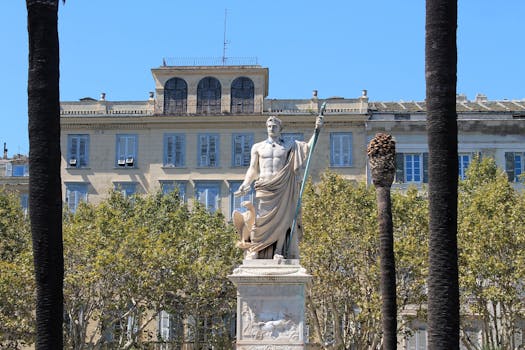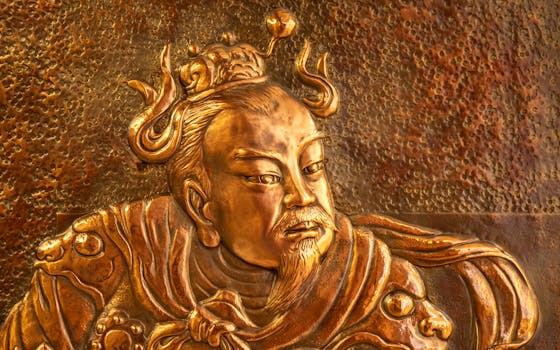Indice
- The Rise of a Military Genius: Napoleon’s Early Years
- From Revolution to Power: Napoleon’s Ascent in French Politics
- Crowning Achievement: Napoleon Becomes Emperor of France
- Expanding an Empire: Napoleon’s Major Military Campaigns
- Beyond the Battlefield: Napoleon’s Domestic Reforms and Legacy
- The Beginning of the End: Napoleon’s Russian Campaign and Exile to Elba
- The Hundred Days: Napoleon’s Brief Return to Power
- Defeat at Waterloo: The Final Battle
- Saint Helena: Napoleon’s Last Years in Exile
- The Emperor’s Last Breath: Napoleon’s Death and Legacy
- Conclusion: Napoleon’s Enduring Impact on World History
The Rise of a Military Genius: Napoleon’s Early Years

Childhood and Education
Napoleon Bonaparte was born on August 15, 1769, in Ajaccio, Corsica, to Carlo Buonaparte and Letizia Ramolino. He was the fourth of eleven children in a minor Corsican noble family. Napoleon’s early education took place in Autun, France, and later at the École Militaire in Paris, where he graduated in 1785 as a second lieutenant in the French army.
Rise to Prominence
Napoleon’s military career began during the French Revolution, where he quickly rose through the ranks. In 1793, he became a brigadier general at the age of 24 and played a key role in the Siege of Toulon, where he successfully defended the city against the British. His strategic thinking and military genius earned him recognition and promotion to major general in 1795. By 1796, Napoleon was appointed as the Commander-in-Chief of the French army in Italy, where he achieved a series of victories against the Austrians and their allies.
The Coup d’État
In 1799, Napoleon returned to Paris and participated in the Coup d’État that overthrew the French Directory, marking the beginning of the Consulate period. As the First Consul, Napoleon held absolute power and began to reform the French government, laws, and institutions, laying the foundation for the Napoleonic Empire.
From Revolution to Power: Napoleon’s Ascent in French Politics
The French Revolution and Napoleon’s Early Involvement
The French Revolution played a pivotal role in Napoleon’s rise to power. In 1789, the revolution began with the Storming of the Bastille, and by 1791, the monarchy had been abolished. Napoleon, who was then a young officer, became involved in the revolution and quickly rose through the ranks. He was appointed as a lieutenant colonel in 1792 and played a key role in the Siege of Toulon, where he successfully defended the city against the British.
Napoleon’s Military Campaigns and Rise to Prominence
Napoleon’s military campaigns in Italy and Egypt further solidified his position as a military genius. In 1796, he was appointed as the Commander-in-Chief of the French army in Italy, where he achieved a series of victories against the Austrians and their allies. His success in Italy led to his appointment as the Commander-in-Chief of the French army in Egypt in 1798. Although the Egyptian campaign was ultimately unsuccessful, Napoleon’s military prowess and strategic thinking earned him recognition and admiration from the French people.
The Coup d’État and Napoleon’s Rise to Power
In 1799, Napoleon returned to Paris and participated in the Coup d’État that overthrew the French Directory, marking the beginning of the Consulate period. As the First Consul, Napoleon held absolute power and began to reform the French government, laws, and institutions, laying the foundation for the Napoleonic Empire. His rise to power was meteoric, and by 1804, he had declared himself Emperor of France, marking the beginning of the Napoleonic Empire.
Crowning Achievement: Napoleon Becomes Emperor of France

The Road to Empire
Napoleon’s rise to power was a gradual one, with each step carefully planned and executed. As the First Consul, he had already consolidated his power and begun to reform the French government, laws, and institutions. However, he knew that to secure his legacy and cement his position as the most powerful man in France, he needed to take the next step: becoming Emperor of France. In 1804, Napoleon was crowned Emperor in a grand ceremony at Notre Dame Cathedral, marking the beginning of the Napoleonic Empire.
The Coronation and its Significance
The coronation of Napoleon as Emperor of France was a highly symbolic event, marking the culmination of his rise to power. The ceremony was attended by the cream of French society, including nobles, bishops, and high-ranking officials. Napoleon’s coronation was not just a personal triumph but also a symbol of the power and prestige of the French Empire. As Emperor, Napoleon would go on to shape European politics, military strategy, and culture for over a decade.
Consolidating Power and Securing Legacy
As Emperor, Napoleon continued to consolidate his power and secure his legacy. He centralized authority, reformed the French government, and expanded the Empire through military conquests. He also introduced the Napoleonic Code, a comprehensive set of laws that would shape French law and governance for centuries to come. Napoleon’s legacy would be marked by both brilliant military victories and disastrous defeats, but his impact on European history would be undeniable.
Expanding an Empire: Napoleon’s Major Military Campaigns

Italian Campaign (1796-1797)
Napoleon’s military campaign in Italy was a defining moment in his career. As the Commander-in-Chief of the French army in Italy, he led his troops to a series of victories against the Austrians and their allies. The campaign began in April 1796, when Napoleon defeated the Austrians at the Battle of Montenotte, followed by victories at the Battle of Lodi and the Battle of Castiglione. By the end of the campaign, Napoleon had conquered much of northern Italy, establishing French control over the region.
Egyptian Campaign (1798-1801)
Napoleon’s military campaign in Egypt was a bold but ultimately unsuccessful attempt to expand French influence in the Middle East. In 1798, Napoleon led a large expeditionary force to Egypt, where he defeated the Mameluke army at the Battle of the Pyramids. However, the campaign was marked by several setbacks, including the defeat of the French fleet by the British at the Battle of the Nile. Despite these challenges, Napoleon’s military prowess and strategic thinking earned him recognition and admiration from the French people.
German Campaign (1805-1806)
Napoleon’s military campaign in Germany was a crushing defeat for the Austrian and Russian armies. In 1805, Napoleon defeated the Austrians at the Battle of Ulm, followed by a decisive victory over the combined Austrian and Russian armies at the Battle of Austerlitz. The campaign marked a significant turning point in Napoleon’s career, cementing his reputation as a brilliant military strategist and tactician. The Treaty of Pressburg, signed in December 1805, marked the beginning of French dominance over Central Europe.
Peninsular War (1807-1814)
Napoleon’s military campaign in the Iberian Peninsula was a long and bloody conflict that drained French resources and manpower. In 1807, Napoleon invaded Spain and Portugal, but the campaign was marked by several setbacks, including the defeat of the French army at the Battle of Vitoria. Despite these challenges, Napoleon’s military prowess and strategic thinking earned him recognition and admiration from the French people. However, the campaign ultimately ended in defeat, as the British and Spanish armies drove the French out of the peninsula.
Russian Campaign (1812)
Napoleon’s military campaign in Russia was a disastrous defeat that marked the beginning of the end of his empire. In 1812, Napoleon led a massive army into Russia, but the campaign was marked by several setbacks, including the defeat of the French army at the Battle of Borodino. The harsh Russian winter and the scorched earth policy pursued by the Russian army decimated the French army, forcing Napoleon to retreat back to France. The campaign marked a significant turning point in Napoleon’s career, as his reputation and power began to decline.
Beyond the Battlefield: Napoleon’s Domestic Reforms and Legacy
Centralization and Administrative Reforms
Napoleon’s domestic reforms aimed to create a more efficient and centralized government. He introduced the concept of prefects, who were responsible for administering the provinces and implementing the Emperor’s policies. He also established the Council of State, a group of advisors who helped him make key decisions. Napoleon’s administrative reforms also included the creation of a civil code, which provided a comprehensive set of laws governing personal and property rights.
Economic Reforms and Infrastructure Development
Napoleon’s economic reforms aimed to stimulate economic growth and improve the standard of living for the French people. He introduced the Franc Germinal, a new currency that replaced the old French currency, and established the Banque de France, a central bank that regulated the money supply and provided loans to businesses. Napoleon also invested heavily in infrastructure development, including the construction of roads, bridges, and canals. The most notable example is the Canal du Midi, a canal that connected the Mediterranean Sea to the Atlantic Ocean.
Education and Cultural Reforms
Napoleon’s education and cultural reforms aimed to promote the arts and sciences, as well as to create a more educated and cultured population. He established the University of France, a centralized university system that provided education to students from all over the country. He also introduced the baccalauréat, a national exam that tested students’ knowledge in various subjects. Napoleon’s cultural reforms also included the establishment of the Louvre Museum, which showcased the artistic treasures of France.
The Beginning of the End: Napoleon’s Russian Campaign and Exile to Elba
The Russian Campaign: A Turning Point in Napoleon’s Career
Napoleon’s military campaign in Russia was a disastrous defeat that marked the beginning of the end of his empire. In 1812, Napoleon led a massive army into Russia, but the campaign was marked by several setbacks, including the defeat of the French army at the Battle of Borodino. The harsh Russian winter and the scorched earth policy pursued by the Russian army decimated the French army, forcing Napoleon to retreat back to France. The campaign marked a significant turning point in Napoleon’s career, as his reputation and power began to decline.
The Sixth Coalition and the Battle of Leipzig
In 1813, the Sixth Coalition, consisting of Russia, Prussia, Austria, and Britain, was formed to defeat Napoleon and the French Empire. The coalition armies, led by the Duke of Wellington and Field Marshal Gebhard von Blücher, defeated Napoleon at the Battle of Leipzig, also known as the Battle of the Nations. The defeat marked a significant turning point in Napoleon’s career, as he was forced to retreat back to France and eventually abdicate the throne.
Exile to Elba: Napoleon’s Punishment
As a punishment for his defeat and forced abdication, Napoleon was exiled to the island of Elba, a small island in the Mediterranean Sea. He was given sovereignty over the island and a small army to govern it. However, Napoleon’s time on Elba was short-lived, as he would eventually escape and return to power in France, marking the beginning of the Hundred Days period.
The Hundred Days: Napoleon’s Brief Return to Power

Escape from Elba and Return to Power
Napoleon’s exile to Elba was short-lived, as he escaped from the island in February 1815. He sailed to France, where he landed near Cannes and began to rally his loyal followers. As he marched towards Paris, his popularity grew, and he was eventually welcomed back as Emperor. This period, known as the Hundred Days, was a brief but tumultuous time in Napoleon’s life, as he attempted to reassert his power and authority.
The Hundred Days: A Period of Reorganization and War
During the Hundred Days, Napoleon reorganized his government and military, appointing new ministers and generals. He also issued several decrees, including the Decree of Lyon, which re-established the Imperial Guard. However, the European powers, including Britain, Prussia, and Russia, were not willing to accept Napoleon’s return to power, and they formed the Seventh Coalition to defeat him. The coalition armies, led by the Duke of Wellington and Field Marshal Gebhard von Blücher, eventually defeated Napoleon at the Battle of Waterloo, marking the end of the Hundred Days and Napoleon’s final exile.
Final Exile and Death
After his defeat at Waterloo, Napoleon was exiled to the island of Saint Helena, a remote island in the South Atlantic Ocean. He was given a small allowance and a group of loyal followers to keep him company. However, his health began to decline, and he died on May 5, 1821, at the age of 51. The official cause of death was stomach cancer, but there is still some speculation about the actual cause of his death. Napoleon’s legacy continues to be debated among historians and scholars, but his impact on European history and politics is undeniable.
Defeat at Waterloo: The Final Battle

The Seventh Coalition and the Battle of Waterloo
The Seventh Coalition, consisting of Britain, Prussia, Russia, and several other European powers, was formed to defeat Napoleon and the French Empire. The coalition armies, led by the Duke of Wellington and Field Marshal Gebhard von Blücher, eventually defeated Napoleon at the Battle of Waterloo, marking the end of the Hundred Days and Napoleon’s final exile. The battle took place on June 18, 1815, near the town of Waterloo, Belgium, and was a decisive victory for the coalition forces.
The Battle of Waterloo: A Turning Point in European History
The Battle of Waterloo was a turning point in European history, marking the end of the Napoleonic Wars and the French Empire. The battle was a bloody and intense conflict, with over 47,000 casualties on both sides. Napoleon’s defeat at Waterloo marked the beginning of a new era in European politics, as the coalition powers began to reorganize the continent and establish a new balance of power. The Congress of Vienna, which took place in 1815, was a direct result of the Battle of Waterloo, and it established the framework for European politics for the next century.
Napoleon’s Final Exile and Death
After his defeat at Waterloo, Napoleon was exiled to the island of Saint Helena, a remote island in the South Atlantic Ocean. He was given a small allowance and a group of loyal followers to keep him company. However, his health began to decline, and he died on May 5, 1821, at the age of 51. The official cause of death was stomach cancer, but there is still some speculation about the actual cause of his death. Napoleon’s legacy continues to be debated among historians and scholars, but his impact on European history and politics is undeniable.
Saint Helena: Napoleon’s Last Years in Exile
Saint Helena: The Final Resting Place
Napoleon was exiled to the island of Saint Helena, a remote island in the South Atlantic Ocean, after his defeat at Waterloo. The British had chosen this island for its isolation and inaccessibility, making it the perfect place to keep Napoleon under close supervision. The island was a rocky, barren lugar with a tropical climate, and it was surrounded by British ships to prevent any escape attempts.
Life in Exile: Routine and Surveillance
Napoleon’s life in exile was marked by routine and surveillance. He was given a small allowance and a group of loyal followers to keep him company, but his every move was closely monitored by the British. He was allowed to take short walks on the island, but only under the supervision of British soldiers. Napoleon’s main pastime was reading and writing, and he spent many hours in his study, working on his memoirs and writing letters to his loved ones.
Decline of Health and Eventual Death
Napoleon’s health began to decline significantly during his time on Saint Helena. He suffered from a series of ailments, including stomach problems, headaches, and fatigue. The exact cause of his death is still disputed among historians, but the official cause was stomach cancer. Napoleon died on May 5, 1821, at the age of 51, surrounded by his loyal followers. His body was initially buried on Saint Helena, but it was later exhumed and returned to France, where he was reburied in the Hôtel des Invalides in Paris.
The Emperor’s Last Breath: Napoleon’s Death and Legacy

The Cause of Death: A Debate Among Historians
Napoleon’s death on May 5, 1821, was a significant event in world history, marking the end of an era and the beginning of a new chapter in European politics. The official cause of death was stomach cancer, but there is still some debate among historians about the actual cause of his death. Some theories suggest that Napoleon was poisoned, possibly by one of his loyal followers or by the British, who were keen to see him dead. However, there is no concrete evidence to support these claims, and the majority of historians accept that stomach cancer was the cause of his death.
Napoleon’s Legacy: A Complex and Contested Topic
Napoleon’s legacy is a complex and contested topic, with different historians and scholars offering varying assessments of his impact on European history. Some view him as a brilliant military strategist and a visionary leader who modernized Europe and brought about significant reforms. Others see him as a power-hungry dictator who was responsible for the deaths of millions of people and the destruction of entire cities. Napoleon’s legacy continues to be debated among historians and scholars, but his impact on European history and politics is undeniable.
The Funeral and Burial: A Grand Affair
Napoleon’s funeral and burial were grand affairs, with the French government and the European monarchies paying their respects to the fallen Emperor. His body was initially buried on Saint Helena, but it was later exhumed and returned to France, where he was reburied in the Hôtel des Invalides in Paris. The funeral procession was a grand spectacle, with thousands of people lining the streets to pay their respects to the Emperor. Napoleon’s burial marked the end of an era, and it was a significant event in European history.
Conclusion: Napoleon’s Enduring Impact on World History

Lasting Reforms and Institutions
Napoleon’s impact on European history and politics is undeniable. His lasting reforms and institutions continue to shape France and Europe today. The Napoleonic Code, a comprehensive set of laws that governed civil and criminal matters, has been adopted by many European countries. The Banque de France, established by Napoleon, remains one of the most powerful central banks in the world. His centralization of power and bureaucracy also influenced the development of modern states.
Military Strategy and Logistics
Napoleon’s military victories and innovations in military strategy and logistics continue to study by military historians and strategist around the world. His use of tactical mobility, fire and maneuver, and the Corps system raised the level of combat between armies, and revolutionize the war. He changed the way we think about armies, modernized artillery science, create a very specific tactical military strategy to give him all the opportunity win the fights.
Symbolism and Emotional Resonance
Napoleon’s rise to power from humble origins has become symbolic of human potential for aspiration and transformation. He remained a beacon of French dignity and revolutionary ideals even beyond his ousting of power, inspiring literary romantics who celebrated both himself and national patriotism of post-Napoleonic 19 century. As in the old times many intellectuals and political movements to achieve their liberation from traditional repressive politics. He served as testament to new form of heroic leadership against autocratic despotisms old Europe represented.




